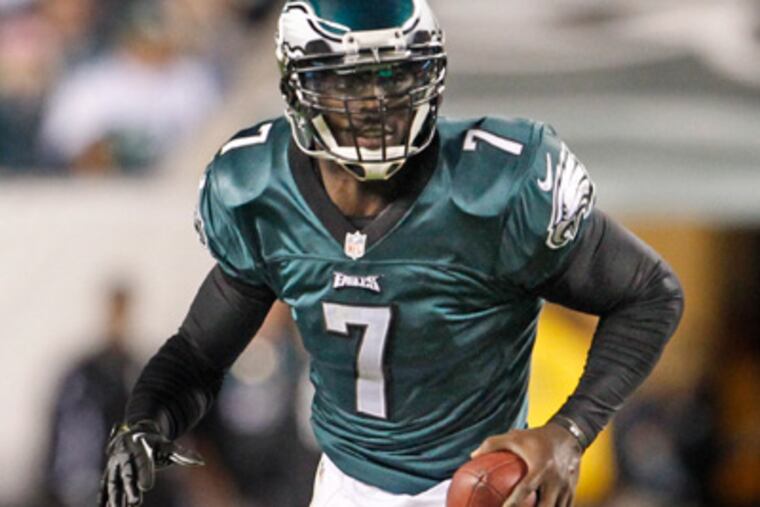Inside the Eagles: Birds adapting offense to makeshift line
Since their disastrous first half in Arizona, the Eagles have displayed a more balanced offense, with Michael Vick making quicker throws to receivers who are running shorter routes.

Since their disastrous first half in Arizona, the Eagles have displayed a more balanced offense, with Michael Vick making quicker throws to receivers who are running shorter routes.
There are reasons for the shift in play-calling - Vick's turnovers, opposing defenses - but the primary cause has been a patchwork offensive line that has yet to find its groove.
The line may never jell because of downgrades at center and left tackle and the continuing struggles of the right guard. If it does not solidify, the Eagles will be forced to maintain a similar game plan going forward.
While that may appease those who favor a ball-control offense that takes the football out of the turnover-prone Vick's hands, it won't do much to improve the Eagles' problem putting points on the board.
Their offense is 11th in the league in yards per game, but 31st in points. The Eagles' 14 turnovers - 11 of which are Vick's - are partly responsible for this disparity. If Vick's four red-zone turnovers were converted into touchdowns, the Eagles would be averaging 21.6 points a game instead of 16.
But that would get them to only 19th in the league. A balanced run-pass ratio that netted 19 points against the New York Giants worked, and a relatively balanced one the following week in Pittsburgh came close to producing a win. But it is an unsustainable approach for a fastbreak offense built to score points quickly.
At least it was built that way with a line that gave Vick enough time in the pocket. But after injuries to Jason Peters and Jason Kelce, Andy Reid and Marty Mornhinweg have been forced to pull in the reins.
Some of the reasons were situational and related to Vick's slow start, but Reid and Mornhinweg have dialed up fewer pass plays that have their quarterback throwing in the 10-20 yard range over the last 21/2 games.
The over-20-yard throws are still there, but Vick's pass attempts of the long-to-intermediate variety have dipped significantly. In the first two games and the first half of the Cardinals game, 35 of Vick's 97 "aimed" passes - or 36.1 percent - traveled between 10 and 19 yards, according to Pro Football Focus.
Since then only 11 of 67 passes (16.4 percent) have gone that far. Reid and Mornhinweg, meanwhile, have called for more passes in the under-ten-yard range, short throws that often require Vick to make one read. Of his 68 "aimed" pass attempts over the last 21/2 games, 51 percent have gone this distance, compared to 39 percent before.
The shorter throws appear to be affecting the Eagles' production on first down, especially when they pass. Over the previous three seasons, they averaged considerably more yards when they threw on first down than on any other down.
Last season, the Eagles averaged 8.24 yards per passing play on first down, 6.54 on second, and 6.39 on third. In 2010, they averaged 7.59 on first down, 6.29 on second, and 5.8 on third. And in 2009, it was 8.4, 6.28, and 5.9.
This season, the Eagles have gained only 5.71 yards per passing play on first down, 7.46 on second, and 6.58 on third.
Rather than throw downfield on first down when teams are least expecting the pass, the Eagles are opting for shorter throws. They're also running more - 46 percent of the time on first down this season, up from 40 percent in 2011 and 2010 and 43 percent in 2009.
"You've got to have a good mix," Reid said Monday when he was asked whether his offense had become too conservative. "You've got to have the blend of shots down the field, you've got to have that threat, you've got to have your short-intermediate game going, you've got to be able to move the pocket a little bit, and you've got to be able to run the football. We just have to do it better."
In a league that has increasingly tilted its rules to favor offenses, the Eagles have to score more points if they want to succeed. The top-scoring teams either have the best records - Houston (5-0), Atlanta (5-0), San Francisco (4-1) and Chicago (4-1) - or are recent Super Bowl champions that many still consider contenders, such as New England (3-2) and the New York Giants (3-2).
The Eagles were built to score. In their previous three seasons, they finished eighth, third, and fifth in points. Even with all of last season's turnovers, they still managed to score 24.8 points a game.
But that was with an offensive line anchored by Peters that allowed Vick time in the pocket to stretch the field. Demetress Bell at left tackle, Dallas Reynolds at center, and Danny Watkins at right guard have not been consistent enough for Reid and Mornhinweg to open up their offense.
There is time for the unit to jell. But it is more likely that Vick will stop turning over the ball at this rate before the line improves.